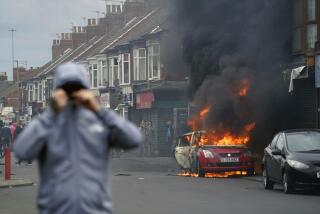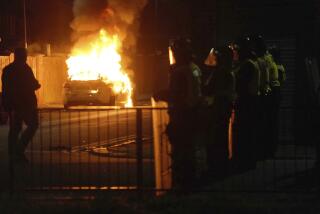Days of Anxiety for Muslim Londoners
- Share via
LONDON — In a neighborhood of tea shops and black abayas, along sidewalks where the sounds of Arabic linger with the hiss and steam of laundermats, Mohammed Khaldi nibbled on hummus and made an unsettling comparison.
“I was in New York when Sept. 11 happened,” said Khaldi, a nautical engineer. “People then wouldn’t get close to you if you were a Muslim. They’d say, ‘We better stay away from him.’ It’s the same thing in London since the terrorist attacks. I was in Piccadilly the other day, and there was a guy cursing Muslims.”
Hate crimes and racial epithets have increased since the July 7 bombings and the July 21 attempted attacks on London’s subways and buses. Many of Britain’s estimated 1.6 million Muslims also feel trapped between militants hiding among them and the security forces conducting raids in their communities. Imams are seeking to calm passions as young Muslims, many of them poor and angry, blame Prime Minister Tony Blair’s foreign policy for bringing jihad to British soil.
Statistics on race- and religion-related offenses against South Asians and Muslims, ranging from name-calling to assaults, show a marked increase.
The Muslim Safety Forum, an advisory board, found that after the July 7 transit bombings, which authorities say were carried out by three British Pakistanis and a Jamaican immigrant, attacks against South Asians jumped by 20%.
Police reports on religiously motivated hate crimes in London have climbed even more dramatically. They jumped from 40 in a three-week period in July of last year to 269 during the same span last month. A study by the Guardian newspaper found that racially motivated attacks in London nearly doubled to 60 a day immediately after the July 7 and July 21 attacks.
One of those targeted Emdad Rahman, who was sitting at a traffic light with a friend in the East End recently when a white man confronted him.
“A lad about 6 feet tall walked up and yelled abuse, calling me a ‘Pakistani’ and saying that he was going to send me back to my village,” said Rahman, a social worker. “I unbuttoned my shirt and showed my St. George flag T-shirt before telling him that I was born here too. Before I knew it, one of his mates came from nowhere with a steering lock and started smashing the car windows.”
Fearing an escalation of such assaults, a prominent moderate Muslim leader, Zaki Badawi, has urged Muslim women not to wear head scarves. “We advise Muslim women who fear being attacked physically or verbally to remove their hijab so as not to be identified by those hostile to Muslims.”
Most Muslims here deplore the recent bombings and support increased vigilance by security forces. Yet they feel vulnerable, especially young men, who often are targeted for police searches when passing subway entrances. Such practices are part of the new difficulties in an unnerved nation where mosques are defaced and suspects are arrested and forced into protective chemical suits to preserve possible evidence of bomb making.
Home Office Minister Hazel Blears has begun meetings with Islamic organizations to defuse concerns of racial profiling after a police chief commented that his officers shouldn’t “waste time searching old, white ladies.”
Muslim terrorists previously “fulfilled the stereotype of bearded, hook-handed mad mullahs, but the bombers of today were just like me,” Iqbal Hussain, an information technology consultant, wrote in a recent essay in the Evening Standard newspaper. “It is that that makes us all paranoid. Whereas previously I wouldn’t have worried how people might perceive me, in light of the terrorist attack I’m cautious.”
He said the subway had become “a minefield of dos and don’ts.”
“While reading Harry Potter,” he said, “I ensure I show the cover so no one thinks I’m absorbed in the Koran.”
Khadim Hussain, president of the Council of Mosques in the city of Bradford, said, “It makes life difficult for the Muslim community. That’s the reality we are facing.
“Those involved in the attacks were Muslims. We can’t deny that. In the days of the Irish Republican Army violence, it used to be suspicious white men who were stopped and searched by police. Now it’s Muslims.”
The bombings and the ripple of suspicions that followed, including an unarmed Brazilian man being mistaken for a militant and shot to death by police, have led to an atmosphere of wariness in immigrant neighborhoods. Some Muslim leaders are concerned that new anti-terrorism laws being considered by Parliament, such as making it a crime to “glorify” terrorist acts, may lead to curtailment of free speech and other civil rights.
Calls for new laws heightened in the conservative media when two Muslim radicals living in Britain appeared on a BBC documentary. One of the men, Abu Izzadeen, said, “Those who do suicide operations are completely praiseworthy. I would never denounce the bombings because we always stand with the Muslims.”
Many Muslims these days, however, are circumspect in their conversations. Amid the shabby textile stores and garment wholesalers on London’s Whitechapel Road, few of the Pakistani and Bangladeshi immigrants wanted to discuss the bombings or their aftermath. A young, bearded man at the East End London Center said, “The people who talked to journalists have gone.”
The nearby mosque has received a bomb scare, threatening phone calls and hate letters since the attacks.
Prejudice and rage concern Hany Shamel, a cargo shipper with an office off Edgware Road, near Hyde Park in central London. But like thousands of Muslims, he is more frightened of Islamic militants burrowed into immigrant communities. Shamel, who came to Britain from Egypt as a child more than 30 years ago, said he didn’t want extremists with backpacks and explosives to jeopardize what he had built.
“I support the police 100%,” said Shamel, hunched over a calculator. “These terrorists spoil business for everyone. They live in this country. They should respect this country.
“If you’re a straightforward and honest person, why should you be worried if the police check you? I’ve got family here. You wouldn’t like it if someone blew himself up on a bus.”
He said his business -- shipping belongings of tourists on long vacations -- was down 60% since the bombings.
The experiences of Rahman and Shamel underscore what the Muslim community views as its biggest challenges: racial discrimination that threatens the nation’s multiculturalism and a scattered army of militants living undetected with other Muslims on tree-lined streets and in brick apartment buildings. These dangers also reflect the growing polarization of the community since the Sept. 11 attacks on the United States as affairs in the Middle East resonate with Muslims throughout Europe.
Radical organizations such as the Hizb ut-Tahrir accuse the Blair government of using fear over the bombings to divide Muslims and draw attention away from its support of U.S. policies in Iraq and Afghanistan. Muslims at a recent meeting of Hizb ut-Tahrir, which advocates the creation of an Islamic state, said they were frustrated that their protests against British foreign policy were seldom heard by a government that they believed wanted to weaken an already splintered community.
“The insistence of labeling the Muslims into ‘moderate’ and ‘extremist’ is part of an extremely dangerous plan by the government to create divisions within the Muslim community and ultimately create a pliant Muslim community silent to the atrocities committed by Blair and [President] Bush,” said a flier distributed by Hizb ut-Tahrir at its meeting.
A man who gave his name as Abu Zabair was among the attendees. “The British media are biased, so Muslims are hungry and thirsty for meetings like this,” he said. “ ... They’re feeling vulnerable. We don’t advocate violence. We want to live in peace, but there’s a fear we may not be treated properly.”
*
Times staff writer Janet Stobart and special correspondent Vanora McWalters contributed to this report.
More to Read
Sign up for Essential California
The most important California stories and recommendations in your inbox every morning.
You may occasionally receive promotional content from the Los Angeles Times.














